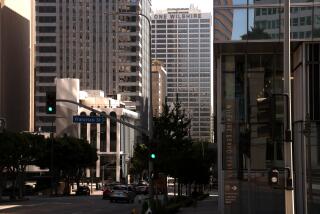One Wilshire sells for record $437.5 million
Two decades ago, One Wilshire was just another fading office tower losing its white-collar tenants to splashy new skyscrapers nearby. Today the unassuming high-rise is one of the most valuable in the city, having sold for a record $437.5 million.
The reason for its transformation from ordinary to extraordinary: the Internet.
Built in 1966, the building has become one of the worldâs top three telecommunications centers and is widely regarded in the industry as the single most important telecommunications hub in the Western U.S.
Billions of phone calls, emails and Internet pages pass through One Wilshire every week because it is the primary terminus for major fiber-optic cable routes between Asia and North America
âYou canât reproduce the connectivity,â said real estate broker Kevin Shannon of CBRE Group Inc. âItâs telecom gold.â
From the street, the office building doesnât reveal its true identity, with a third of the space still home to law firms, stockbrokers and other traditional offices. But telecommunications firms occupy floor after floor.
At a sale price of about $660 per square foot, âthis is the highest price per foot ever paid for a downtown L.A. office building, reflecting how much higher telecom rents are compared to downtown office rents,â Shannon said.
By contrast, the more glamorous U.S. Bank Tower -- the tallest building in the West at 72 stories -- was sold in June for about $260 a foot.
GI Partners, a Menlo Park private equity investor, bought One Wilshire from Hines Real Estate Investment Trust. Houston-based Hines paid $287 million for the building in 2007.
The building is one of the three leading communications properties in the world, said Shannon, who represented the seller. The other two main hubs are 60 Hudson Street in New York City and Telehouse in London.
âObviously our buyer thinks itâs going to become more valuable, which should allow them to push rents even higher because of supply and demand,â Shannon said.
Rents at One Wilshire are about $4 per square foot a month, roughly double the rent at U.S Bank Tower, according to real estate data provider CoStar Group.
Among the telecom tenants are Verizon Communications, Sirius XM Radio, China Telecom and data center provider CoreSite Realty Corp.
About a third of the building is standard office space for such tenants as stock brokerage Crowell, Weedon & Co. and law firm Musick Peeler.
The National Security Agency, which tracks overseas communications, is ânot a direct tenant,â a Hines spokeswoman said. The NSA is at the center of controversy over its monitoring of phone conversations, emails and other electronic communication.
One Wilshire, built as a standard office building, lies at the eastern end of Wilshire Boulevard, the commercial spine of Los Angeles that ends at Ocean Avenue in Santa Monica.
The buildingâs developer, S. John Kreedman, came up with the idea of calling it One Wilshire even though its address is 624 S. Grand Ave.
The 663,000-square-foot office building was considered one of downtownâs best for decades, but it began to have difficulty attracting corporate tenants after the downtown office building boom of the late 1980s and early 1990s brought a raft of new competition, including U.S. Bank Tower in 1989.
Fortunes at One Wilshire changed with the Internet boom of the 1990s.
Upstart competitors in the telecommunications industry laid underground cable in downtown Los Angeles with the intention of being near AT&T;âs fortress-like switching center on Grand Avenue at Olive Street, which was then the leading point of communications between the U.S. and Asia.
AT&T; competitors clustered at One Wilshire and it grew to become the premier regional hub.
A handful of other office and retail buildings in the neighborhood also became data-transfer centers, but One Wilshire remains the largest, where about 300 voice and data service providers interconnect.
Demand for heavily secured offices where businesses house their all-important computer servers continues to grow as the world becomes more electronically connected.
Nearly all of us send and receive signals every day through data centers across the country like One Wilshire. Simple tasks such as browsing a website, paying a restaurant bill with a credit card or making a phone call may require their services.
Such automation requires electronic data stored and processed on servers. The innocuous-looking metal boxes are so crucial to corporate Americaâs ability to function that they are guarded with obsessive care.
Data centers are equipped with heavy-duty electrical feeds, powerful air conditioning, emergency generators and tight security.
There are little more than a dozen data centers in Los Angeles County.
In the 1990s, when telecom firms first started taking over other downtown buildings such as the nearby former J.W. Robinsonâs department store on Seventh Street, city leaders grew alarmed. They feared that blocks of the city would become lifeless as their buildings filled up with servers instead of people.
âWe thought we might need regulation to limit those uses,â said Carol Schatz, president of the Central City Assn. business lobby. âThe dot-com boom died quickly and that eliminated the needâ for such controls, she said.
The need for data centers soon revived, but the economic renaissance of downtown Los Angeles in the last decade erased fears that its office buildings would be taken over by machines.
âOur office market is diversifying, not consolidating,â Schatz said.
Hines also sold GI Partners two other office buildings: the Raytheon and DirectTV buildings in El Segundo. Both 11-story towers on East Imperial Highway are fully leased to their namesake tenants. The total value of the three-building transaction was $550 million.
GI Partners said its acquisitions were made through a partnership with the California Public Employeesâ Retirement System.
--
Twitter: @rogervincent
More to Read
Inside the business of entertainment
The Wide Shot brings you news, analysis and insights on everything from streaming wars to production â and what it all means for the future.
You may occasionally receive promotional content from the Los Angeles Times.











